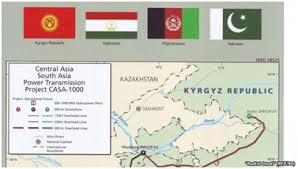Central Asia-South Asia (Casa) 1,000 Hydroelectric Power Import Project
Central Asia-South Asia (Casa) 1,000 Hydroelectric Power Import Project: Pakistan is currently working on the Central Asia-South Asia (Casa) 1,000 hydroelectric power import project. Under this arrangement, Tajikistan and Kyrgyzstan will export 1,300 megawatts, generated through water resources, to Pakistan and Afghanistan.
This is a pilot project that will broaden the energy market of Pakistan for other countries like Russia, Turkmenistan and Kazakhstan.
Tajikistan, rich in hydroelectric power resources, has 4% of the world’s and 53% of Central Asia’s hydel energy resources. At present, the hydroelectric power potential of the country stands at 527 billion kilowatt-hours (kWh) annually, of which only 4-5% is utilized.
The CASA-1000 project will start from Kyrgyzstan and reach Afghanistan through Tajikistan and onward to Pakistan’s Peshawar city. The length of the project in Afghanistan is estimated to eventually run for 562km.

Afghanistan will receive $50 million USD yearly for the transit of power and in addition to this Afghanistan’s strategic location in terms of transit will be highlighted in Asia.
Moreover, infrastructure projects valued at $40 million USD will be implemented alongside the power lines and employment opportunities will be provided for the locals.
The #CASA-1000 Project is an important step in building a functioning, efficient electricity system across Central Asia and South Asia. By facilitating clean power export revenues for the Central Asian countries and by alleviating electricity shortages in the South Asian countries, this project will enhance growth prospects across both regions.

This project demonstrates landmark cooperation among the Kyrgyz Republic, Tajikistan, Pakistan, and Afghanistan. The modern and efficient CASA-1000 electricity transmission system will help transform the region and signify an important step toward realizing the planned #Central Asia-South Asia Regional Electricity Market (CASAREM). The CASAREM initiative will help not only these four countries but also improve the electrical systems and develop inter-regional cooperation between Central Asia and South Asia.
Tajikistan also plans to lay a fiber optic cable along the route of Casa project’s transmission line to connect Central and South Asia.
The CASA-1000 project will include:
- 500 kV AC line from Datka (in the Kyrgyz Republic) to Sugd-500 (477 kilometers away, in Tajikistan)
- 1,300 megawatt AC-DC Converter Station at Sangtuda (Tajikistan)
- 750-kilometer High Voltage DC line from Sangtuda (Tajikistan) to Nowshera (Pakistan)
- 1,300 megawatt DC-AC Converter Station at Nowshera
Pakistan and Tajikistan had also been working on a #transit trade agreement to be signed by the two as well as Afghanistan to connect the two regions through a road network to enhance bilateral trade. They will discuss the progress and suggest measures to resume stalled talks on the agreement.
“Tajikistan also wants to join CPEC and seeks access to Gwadar Port. The two sides will take up this issue as well during meetings on the sidelines,” the official said.
The current volume of annual bilateral trade between the two countries stood at around $42 million (FY 2016-17) and did not commensurate with the strong political ties, the two leaders will discuss ways and means to boost bilateral trade level up to US $500.
For More Information & Videos Subscribe To Our YouTube Channel
